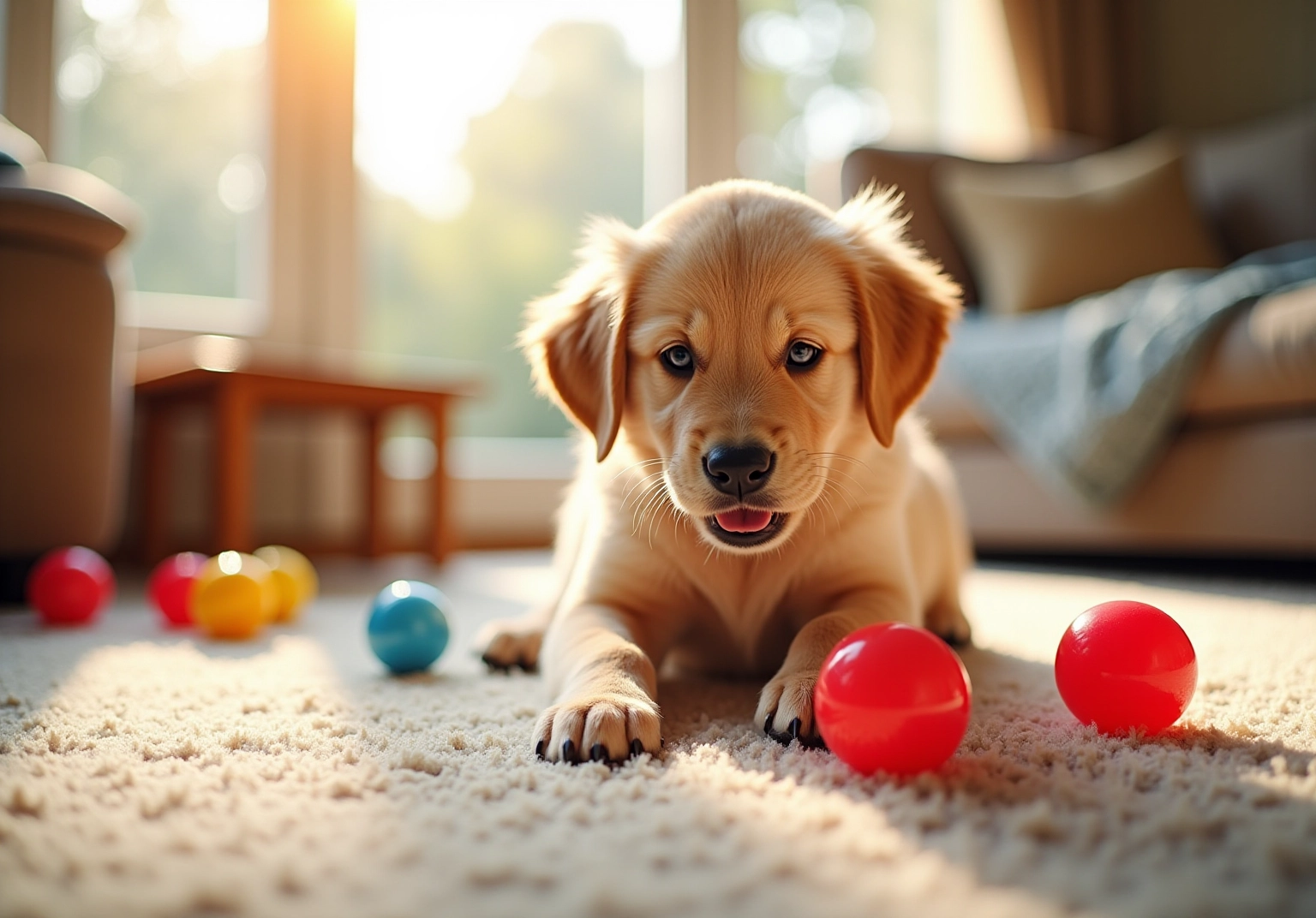
4 Steps to Care for Your Baby Puppy Effectively
Overview
Caring for your baby puppy effectively begins with a deep understanding of their unique needs. It’s essential to establish a consistent routine that not only comforts them but also helps them thrive.
- Socializing your puppy appropriately is key, as it fosters their confidence and happiness.
- Ongoing care and training are vital components of their development.
- Tailored care, which includes a balanced diet, regular exercise, and positive reinforcement in training, is crucial for nurturing a happy and healthy puppy.
By addressing these needs, you can create a loving environment that supports their growth and well-being.
Introduction
Caring for a baby puppy is not only a rewarding endeavor but also a challenging one that calls for a deep understanding of their unique needs. As pet owners embark on this heartfelt journey, they seek not only to nurture their furry companions but also to ensure they blossom into well-adjusted adults. This guide offers essential steps to effectively care for a puppy, from establishing a consistent routine to recognizing the importance of early socialization. However, with an overwhelming amount of information available, how can new pet owners navigate the complexities of puppy care to foster a happy and healthy environment for their beloved new friend?
Understand Your Puppy’s Needs
Caring for your baby puppy involves understanding their unique needs, which are deeply rooted in their breed characteristics. As a loving pet owner, you want to ensure your puppy receives the best possible care. Puppies thrive on a balanced diet, regular exercise, social interaction, and mental stimulation. By exploring your dog’s breed, you can discover specific traits and needs; for example, energetic breeds like Border Collies require more exercise, whereas Bulldogs may prefer a more laid-back lifestyle. It’s concerning to note that a study revealed half of dogs in the UK are not getting the recommended activity levels. This highlights the essential role of sufficient exercise in preventing potential welfare issues for young dogs.
Moreover, certain breeds may be predisposed to particular health concerns, making it vital to consult with a veterinarian for personalized guidance. Dr. Melody Aitchison-Steed, a small animal general medicine practitioner, underscores the importance of understanding a young dog’s breed traits for effective management. Creating a safe and comfortable space for your puppy to rest and play fosters a nurturing environment that promotes their growth and happiness. By acknowledging these factors, you can provide the best care for your furry companion, ensuring they feel loved and supported every step of the way.
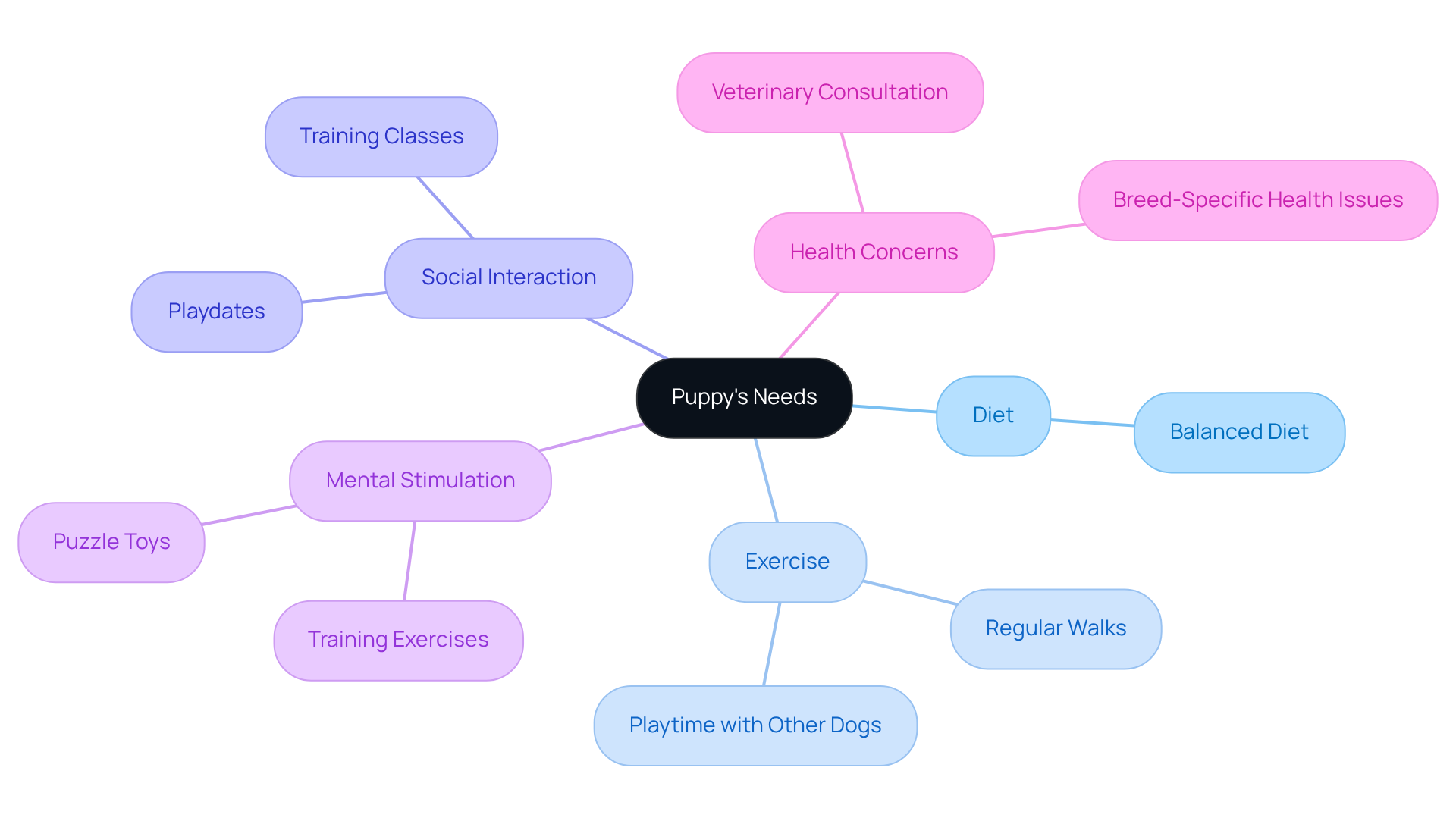
Establish a Routine in the First Week
In the first week, establishing a consistent daily routine is crucial for your baby puppy. This routine should encompass:
- Feeding
- Potty breaks
- Playtime
- Practice sessions
Baby puppies flourish in environments that allow them to anticipate their needs, fostering a sense of security in their new surroundings. For instance, offering your young dog meals at the same times each day and taking them outside for bathroom breaks after eating and napping can significantly aid in housebreaking. Incorporating brief instructional periods to teach essential commands like ‘sit’ and ‘stay’ not only reinforces positive behavior but also strengthens the bond between you and your dog.
Experts highlight that a structured routine is key to effective dog training, as it alleviates anxiety and promotes positive behaviors. Research shows that a baby puppy trained with a consistent schedule experiences greater success in learning commands and adjusting to its new home. By prioritizing routine, you lay the groundwork for a well-adjusted and obedient companion. As dog trainer Victoria Schade wisely notes, ‘A consistent routine is key to helping young dogs feel secure and learn effectively.
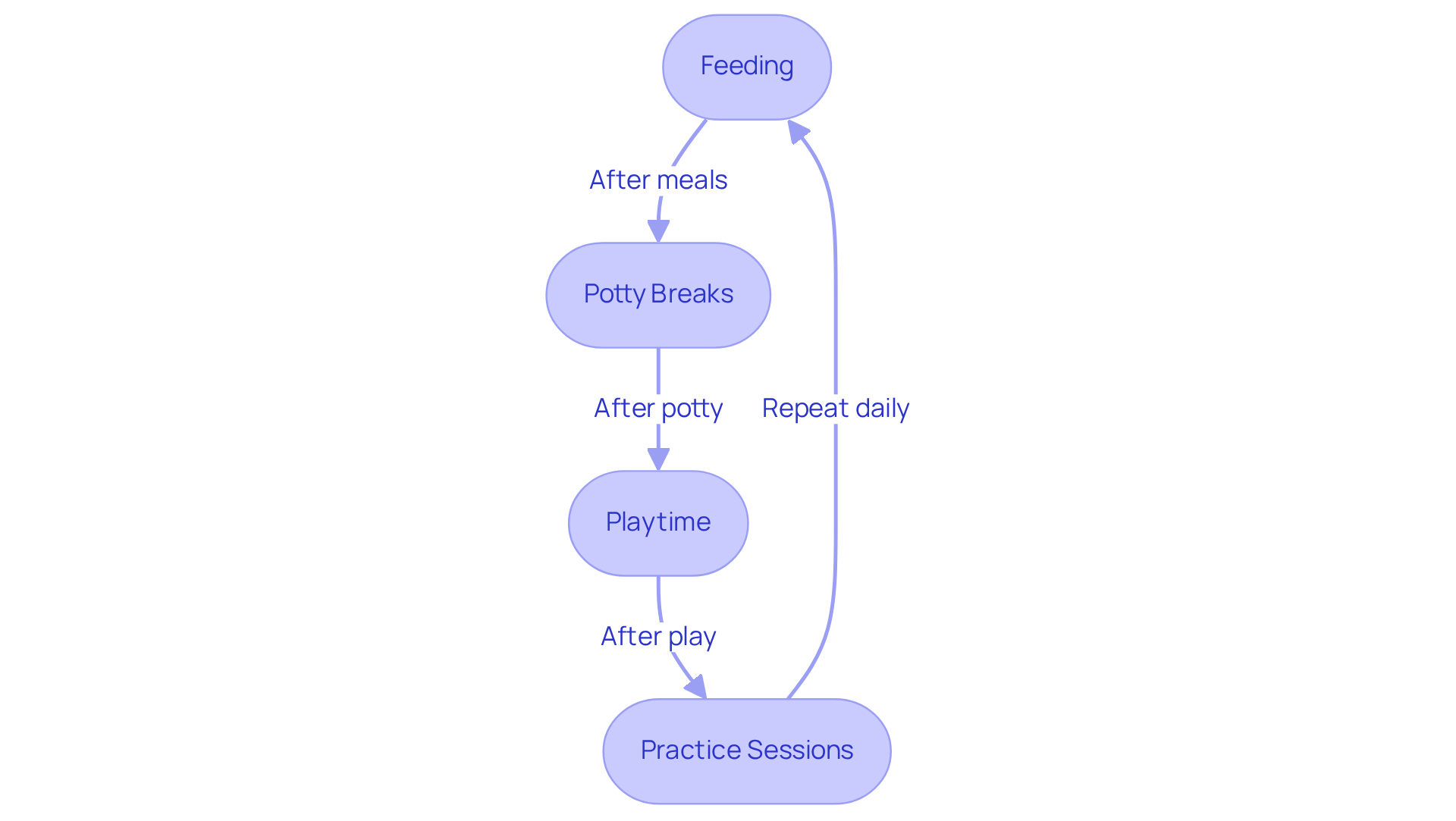
Socialize Your Puppy Effectively
Socialization should begin as soon as your dog is fully vaccinated, ideally between 3 and 14 weeks of age. This is a vital period for introducing them to various environments, people, and other animals. Early exposure is crucial for helping them adapt to different situations, and it can significantly reduce the risk of behavioral issues later in life. In fact, statistics show that early socialization can decrease the risk of behavioral problems by more than 60%.
Consider arranging playdates with other vaccinated dogs or enrolling in structured socialization classes, where they can learn in a controlled environment. It’s essential that these interactions are positive and supervised to prevent any negative experiences that could hinder their development.
As Victoria Schade, a skilled dog trainer, wisely states, ‘Taking the time to properly socialize your baby puppy is one of the best gifts you can give them.’ Gradually exposing your young dog to new sights, sounds, and smells helps build their confidence and adaptability. Activities such as:
- Walks in the park
- Visits to dog-friendly cafes
- Interactions with friendly dogs
can create a rich tapestry of social experiences. Positive reinforcement, through treats and praise during these encounters, encourages your dog to embrace new situations, fostering a love for exploration and enhancing their overall quality of life.
Veterinarians emphasize that well-socialized young dogs are generally healthier and less susceptible to stress-related health problems, making early socialization a crucial investment in your dog’s future. Remember, socialization is an ongoing process that should continue throughout your dog’s life.
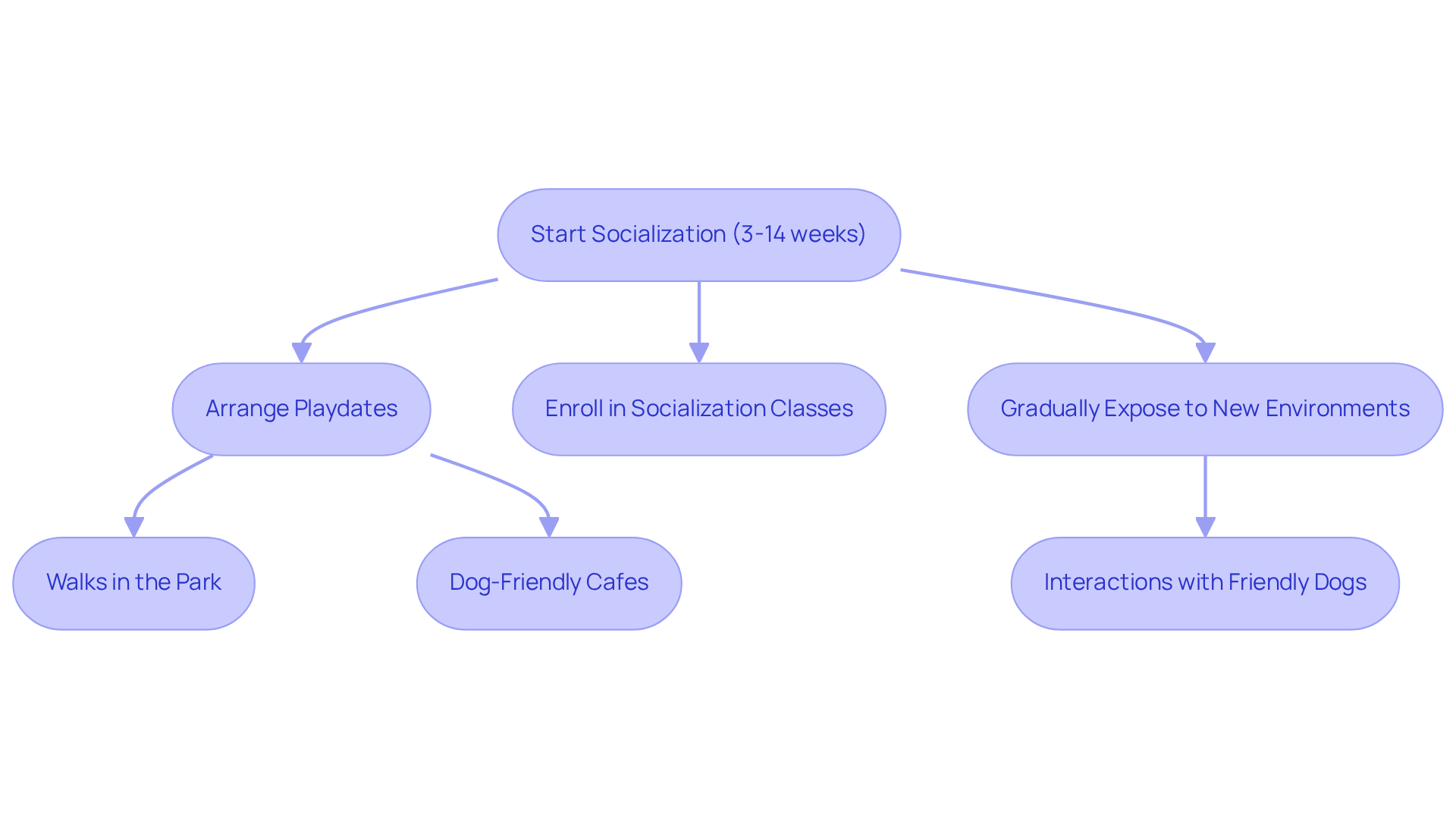
Implement Ongoing Care and Training
After the initial adjustment phase, it is essential to offer continuous support and training for your beloved dog. We understand how much you care about their well-being, and scheduling regular veterinary check-ups is a critical step in monitoring their health and vaccinations. These visits are vital for the early detection of potential issues. In fact, more than 90% of dog owners took their dogs to the vet for at least one visit, underscoring the importance of routine care. Veterinarians recommend that puppies receive a series of vaccinations and health assessments during their first year to ensure they grow into healthy adults.
Integrating instruction into your daily routine can be a rewarding experience. Utilizing positive reinforcement techniques to encourage desirable behaviors fosters a strong bond between you and your furry friend. Participating in brief, regular practice sessions can be more effective than sporadic, lengthy ones; indeed, 73% of dog owners have utilized some kind of teaching method, highlighting its importance. Additionally, consider enrolling your young dog in obedience classes to enhance their skills and socialization with other canines. As Dr. Aspros emphasizes, routine check-ups are vital for your pet’s health, and we want to support you in this journey.
Keep in mind that education is a lifelong journey; nurturing a strong connection with your young dog through consistent support and attention will encourage a well-mannered and joyful adult canine. At Jet Pet Resort, we are dedicated to providing tailored experiences that support your puppy’s ongoing care and training needs. Together, let’s ensure your dog thrives and enjoys a happy, healthy life.
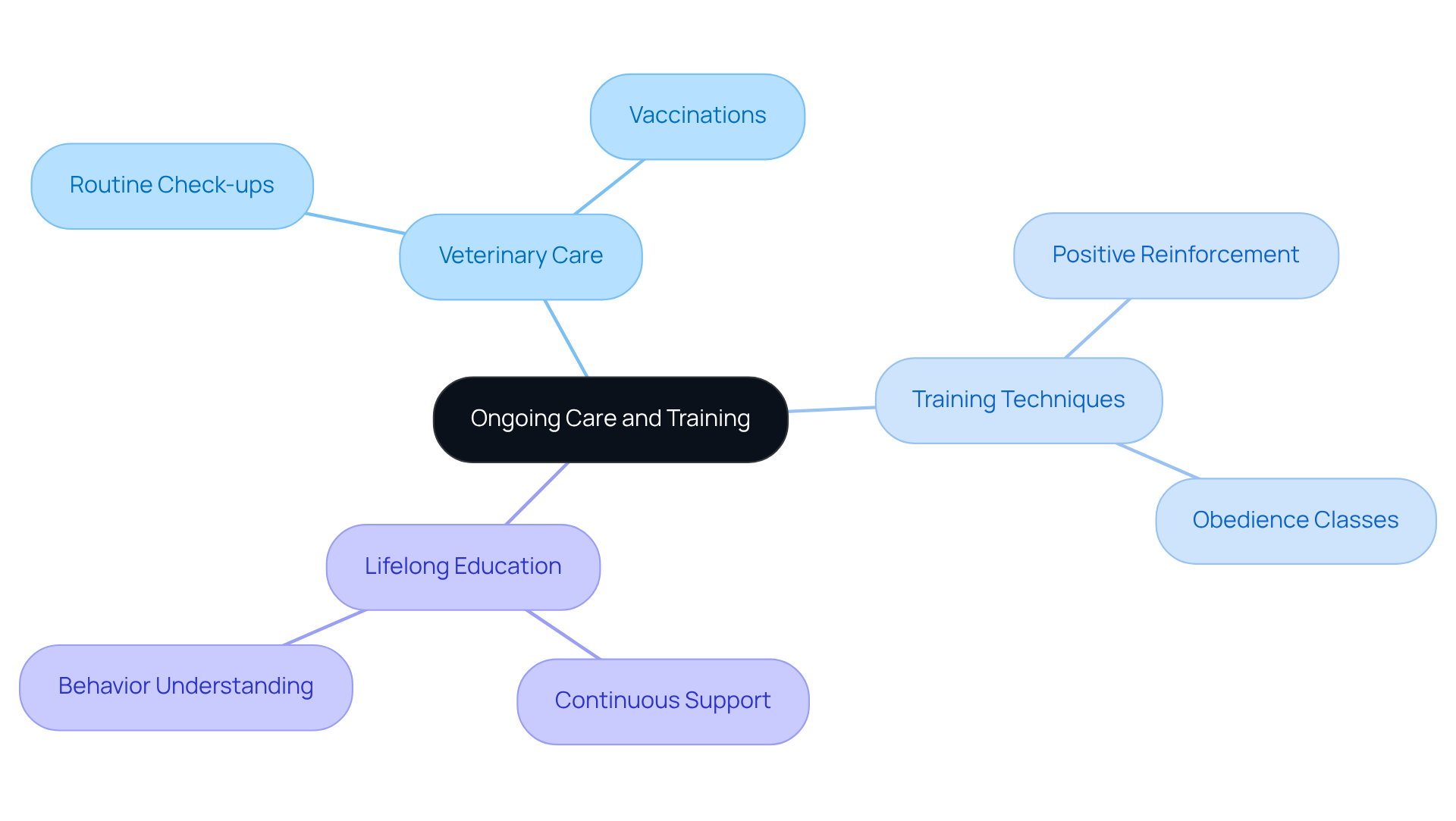
Conclusion
Caring for a baby puppy effectively requires a deep understanding of their unique needs and the implementation of structured routines that foster their development. By prioritizing aspects such as a balanced diet, socialization, and ongoing training, pet owners can ensure their puppies grow into happy and well-adjusted adult dogs. Recognizing the importance of tailored care based on breed characteristics and individual temperament is essential for nurturing a loving and supportive environment.
Throughout the article, key strategies were outlined, including:
- Establishing a consistent daily routine
- Initiating early socialization
- Maintaining ongoing health care through regular veterinary visits
Each of these steps plays a critical role in shaping a puppy’s behavior and overall well-being. By embracing these practices, owners can significantly reduce the risk of behavioral issues and promote a strong bond with their furry companions.
Ultimately, the journey of puppy ownership is not just about meeting basic needs; it is about investing in a lifelong relationship built on trust, understanding, and love. As each puppy is unique, the commitment to providing tailored care and attention will pave the way for a joyful and fulfilling life together. Embrace these essential steps, and watch your puppy thrive into a cherished member of your family.
